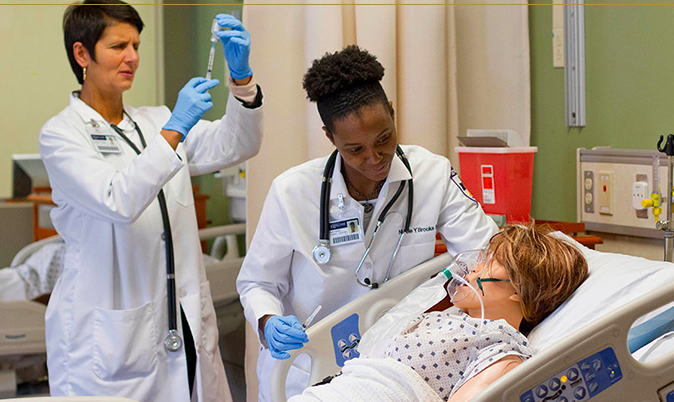Lipscomb’s nursing program, always reliant on physical interaction and hands-on experiences in the past, had to adapt dramatically when the school switched to virtual learning.
The pandemic that mandated virtual learning also caused problems in terms of the opportunities for nursing students.
“Many clinical partners, around the same time Lipscomb decided to switch to virtual learning, also decided to no longer let students into their facilities,” said Dr. Chelsia Harris, the program’s executive director.
“The rationale was to conserve their personal protection equipment, or PPE’s, for essential workers that absolutely needed them.”
“It was challenging for me to finish online in the spring, seeing a lot of cool things in my clinicals (at Vanderbilt Trauma Unit), but was only able to go twice before everything started shutting down,” said McKenzie Allen, a senior.
Despite many clinical partners and direct physical interaction being cut off, the nursing program made successful adaptations, according to Harris.
“We have such incredible faculty and staff that worked really hard to work with some of the vendors in a virtual capacity, and were able to launch a high-fidelity type virtual simulation,” she said. “Some of the simulations are so realistic, and actually have students think more critically than what you thought you would even imagine comparatively to bedside with a real patient.”
“The Tennessee State Board of Nursing as well as our national accreditation body were in full support of the utilization of virtual simulations as long as students were able to meet outcomes,” Harris said.
The sudden shift to isolation for students and faculty did cause adjustment, according to Harris.
“It was gut-wrenching to not be able to see them on a regular basis. So, one of the things we did is set up an encouraging virtual space called ‘College Coffee and Conversations.”
“All of our students also graduated on time, and every single one of our alumni who graduated in may have gotten permission to sit for the NCLEX (National Council Licensure Examination). Three took the examination and all three have passed,” she said.
Virtual learning could potentially produce a new kind of nurse.
“These nurses are not going to be like any other nurse that has been out there yet: The compassion, the drive, and the dedication to the profession, knowing that they’ve overcome so much already.”
Some nursing students and graduates went to work helping medical facilities deal with the need for nurses in this pandemic.
Lipscomb University will be bringing students back on campus for the fall semester, although there is a focus on safety precautions as the pandemic accelerates.
“Clinical partners have opened their doors back open to us, saying, ‘please send your students again,’ taking extra safety precautions of course,” Harris said. “And we are planning to move forward with clinicals in the fall, most likely happening in the beginning.
“As far as Lipscomb is concerned, myself and all of our faculty, that this is a divine calling by God, and so because of that belief, we pour our hearts and souls into everything and truly love our students.”
Photo courtesy of Lipscomb University’s website.

